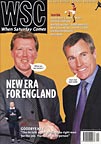 Diego Maradona's new book has been the talk of Argentina. Chris Moss found few surprises in it
Diego Maradona's new book has been the talk of Argentina. Chris Moss found few surprises in it
When it comes to resurrection, Diego Maradona is up there with the saints and prophets. Banned from playing for cocaine abuse, then ephedrine-laced cocktails and now under doctor’s orders, hopeless as a manager, aged 40 but looking 50, he has turned to literature. A new autobiography, Yo Soy El Diego (I am Diego), to be published in Britain next spring, is the edited recordings of chat, babble and bluster taped in Cuba by two “journalist friends” from Buenos Aires
“I begin this book in Havana. At last I’ve decided to tell it all…” The all is his all, of course, and is told with the kind of poise and objectivity you’d expect from a man who thinks life is a football match played far away from home against a team of sworn enemies. The result is a weird mix of confessions, self-indulgence, bitter spleen and some laughs.
The reaction in Buenos Aires has been fairly predictable. At the press conference, probably the biggest media event since Evita bit the dust, the chubby man sits back, wheezing, sticks out his chest, grins, weeps – all the things he does when referees begin to look for cards – and begins to speak, or rather mumble. The massed media applaud every remark they understand, ex-President Menem shows up for a signed copy.
A couple of days later he’s on prime time TV and he looks wasted. All the doctors in Havana can’t change what even Diego admits is getting on for two decades of cocaine abuse. In the book he talks openly about his addiction and slips in some blame for Daniel Passarella, the former national team coach.
“Everything I’ve written is true. I swear on the lives of my daughters,” he says. But he also says, “I am proud of always having been faithful to my convictions, my virtues and my shortcomings.” This is Diego’s problem – pride is more important than the facts of life.
Several British stars figure in the book. In George Best he recognises a kindred spirit. “He was a great player,” writes Maradona, “but he was madder than I am.” Keegan “was my idol for a long time”. Peter Shilton is just called “thermos head”, Maradona’s nickname for all the people he’s not keen on. In Shilton’s case, Maradona was not invited to the testimonial and that seems to be proof that the man beaten by the Hand has a vacuum for brains.
Between sessions of treatment for his addiction and chats with Fidel Castro, Maradona still finds time to keep an eye on the Premiership. Beckham is “too pretty for a football pitch. Although he worries too much about his Spice Girl, sometimes he finds the time to play and he strokes the ball, he strokes it.” The only real star at France 98 according to Maradona was Michael Owen: “Speed, craftiness, balls… I hope injuries don’t mess him up.” More than most Diego knows how little guys get battered when they shine too brightly.
Yo Soy El Diego captures some of the energy, the laddishness, the love of the sport, but the author-speaker’s ugly side – arrogance, bitterness and lack of self-knowledge – comes through too. If you want facts and analysis, stick with Jimmy Burns’s Hand of God, which in many ways does Diego more justice by putting the fall from grace in a broader context. Grimly, there are already rumours of a follow-up autobiography to complete the first person story. Of what, one might ask, given that Diego has not done anything really memorable for almost a decade now.
Surely it’s time to move on to something else. As one journalist asked at the press conference: “When’s the testimonial?” He wasn’t ignored, but he wasn’t given an answer either.
From WSC 166 December 2000. What was happening this month